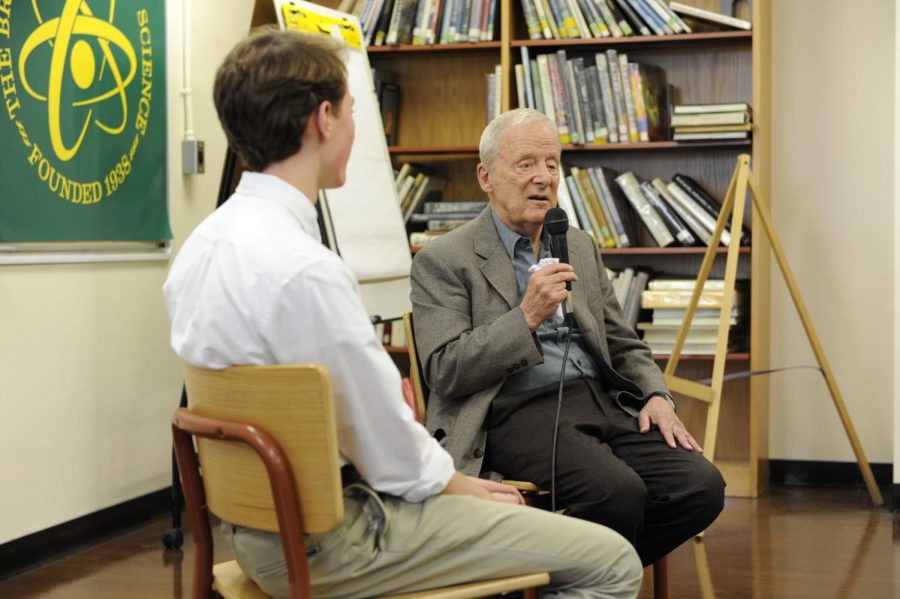Joseph Lelyveld ’54
Pulitzer Prize Winner and Former New York Times Executive Editor
Lelyveld answers students’ questions in an interview with James Snyder ’18.
On November 13, 2017, Joseph Lelyveld ’54 paid a visit to Bronx Science as part of an initiative to commemorate the school’s 80th Anniversary. Lelyveld is a former journalist and prominent author, best known for his role as Executive Editor of The New York Times between 1994 and 2001.
Lelyveld worked at the Times for nearly thirty years, foremost as a foreign correspondent, where he was stationed in South Africa, the Congo, India, Hong Kong, and London. Lelyveld’s experience as a foreign correspondent would later provide material for his books and win him a Pulitzer Prize. He was also extremely accomplished as an editor. As executive editor, Lelyveld said that he was responsible for “the whole damn thing.”
During his visit, Lelyveld interacted directly with students at a larger question-and-answer event and had lunch with them before being inducted into the Hall of Fame. But first, Lelyveld sat down for an extended interview with The Science Survey.
Lelyveld attended Bronx Science between 1951 and 1954, when the school was housed in a different building and only served tenth through twelfth graders. At the time, he said he had a “mixed impression of the school as a school,” though he cherished the student body, which he described as “wonderful.”
As a student, Lelyveld played on the Varsity Soccer team, was an editor of The Science Survey, and was president of Arista (now the National Honor Society)—though he claimed his grades “weren’t up to it.”
Indeed, Lelyveld was not much of an academic in high school: he revealed that his most cherished memories were of parties as opposed to classes. Looking back, the social scene at Bronx Science had more of a truly long-term impact on his life than the academics.
After graduating from Bronx Science, Lelyveld attended Harvard University where he interestingly chose not to write for the college paper. In fact, Lelyveld did not really think about journalism at all throughout his college career.
So why did he become a journalist?
“I sort of flopped into journalism backwards,” he explained. After Harvard, “I went to the Columbia Journalism School for a year. Really, to be completely honest, I did that because I didn’t want to go into the army at that point—it was before Vietnam, but the draft was in effect from [the Korean War].”
After journalism school, in a move that he described as a result of poor career planning, Lelyveld chose to apply for a fellowship to go to Asia. “And I got it!” Lelyveld said, “strangely enough, because I had no background or credentials for it.”
That fellowship would change Lelyveld’s life forever. He traveled in Asia on what was called an “around-the-world ticket,” which allowed him to travel slowly and see many different places. He got married and traveled with his wife, also a Bronx Science graduate. It was in Asia where Lelyveld became a stringer for The New York Times, setting him up for the remainder of his career.
Lelyveld came back knowing exactly what he wanted to be: the New Delhi foreign correspondent for the Times. He started small, as a copy boy—a position he described as “lowly”—though he was quickly promoted to clerk. “They advanced me pretty quickly,” he explained. “After several years, I became a foreign correspondent.”
It was in that role that some would say Lelyveld reached the climax of his career, even if he would go on to serve in more prestigious positions. Though he wanted to return to Asia, Lelyveld instead secured a position in Africa, where he witnessed firsthand apartheid in South Africa; Lelyveld also went to the present-day Democratic Republic of the Congo to report on their independence movement.
Lelyveld’s career as a foreign correspondent was not always straightforward. He explained that he mostly went his own way—he was not a “pack journalist.” When he arrived in South Africa, apartheid was not a major story that had yet garnered much of the attention of Western media.
Being a foreign correspondent was also not without its challenges. Lelyveld was expelled from South Africa in 1966, before which his phones were tapped, he was followed, and he was attacked by the pro-government press. “None of this mattered very much, because I was backed by a major news organization,” explained Lelyveld. “When I was kicked out, all I did was go to the airport, get on a plane, and fly to Rome—it wasn’t such a hard deal.”
However, it was his work in South Africa that would win Lelyveld the Pulitzer Prize in 1986 for his book ‘Move Your Shadow: South Africa, Black and White.’ Though he said South Africa was “one of the last places I wanted to go,” he explained that “when I got there, I was utterly gripped by it.”
Winning a Pulitzer Prize opened up opportunities for Lelyveld. Afterwards, he was able to become a correspondent in India, Hong Kong, and London.
“But I ultimately never wanted to make being a foreign correspondent my career,” explained Lelyveld. “After the first round, I spent about a dozen years overseas and finally came back as an editor—as foreign editor, and then became managing editor and executive editor.”
Lelyveld would serve as an editor for fifteen years. He said that he stepped down “with brilliant timing, five days before 9/11.” Lelyveld oversaw many changes as executive editor of the Times, and ultimately witnessed the transition to printing in color and the launch of the Times’ website.
Newspapers have changed a lot since he was executive editor: jobs in the field are at more of a premium, many local newspapers across the country are shutting down, and overall readership has dropped significantly with many favoring cable news or online blogs. Given this, Lelyveld had some advice for future journalists.
“People should probably think it out better than I did, but I think reporting will always matter, no matter how the media changes.” He explained, “people do great stories now for blogs—for the internet—things that did not exist when I was in journalism.” He said that people should always continue to report and do what they care about, and get as close as they can to big stories.
Regarding more structural problems in the news media—issues like rising sensationalism and attacks from the executive branch — Lelyveld said that he was “very worried about the whole business of fake news.” He furthered that he was also concerned about how easy it has become to dismiss serious scandals as made-up hit-jobs by the opposition party, like in the recent case involving Roy Moore in Alabama.
Lelyveld ultimately said, “I don’t know what will happen politically, but I think it’s a great time to be a journalist, and to bolster the idea that truth matters and discovery of fact matters.”
Lelyveld also had some advice for current Bronx Science students. He said, “Don’t make your minds up so early about what you’re going to do. When I left Bronx Science, I had no idea I was going in the direction I ultimately took—when I left college, I had no idea I was going in the direction that I ultimately took. I tried many things out, [and eventually] one was very congenial to me, and I stayed on that path, and I never really regretted it.” He added that he believes there is a general movement nowadays to determine your career path earlier in life, which he disagrees with.
Perhaps as a result of his experiences, Lelyveld also believes Bronx Science students should not worry so much about their grades. When, years ago, Lelyveld gave the Bronx Science commencement address, he proclaimed “outside of Bronx Science, 93.9 is an FM Station!” He believes that students should do their best, enjoy their time in high school, and keep their grades mostly to themselves.
Nowadays, Lelyveld has no new projects. He spends a lot of time reading; his most recent endeavor is ‘The Golden Bowl’ by Henry James. Even he, a Pulitzer Prize winning journalist, finds James’ long, complicated sentences very difficult. He remarked, “some of them I can read five times and still not be sure what he said.”
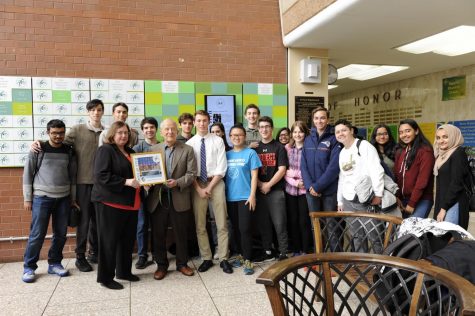
Lelyveld poses in front of the Hall of Fame after speaking with students during his visit.
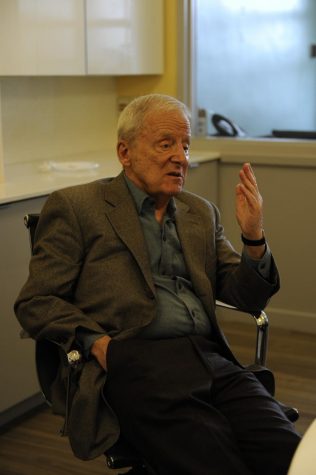
Lelyveld recounts his time at Bronx Science during an interview with the Survey.
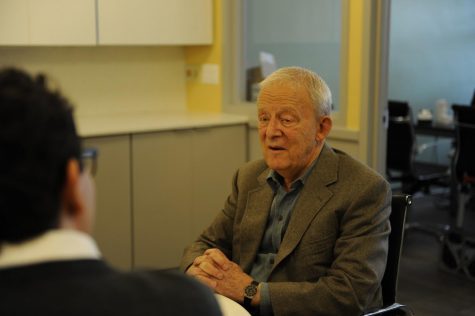
Lelyveld elaborates on his career during an interview with the Survey.
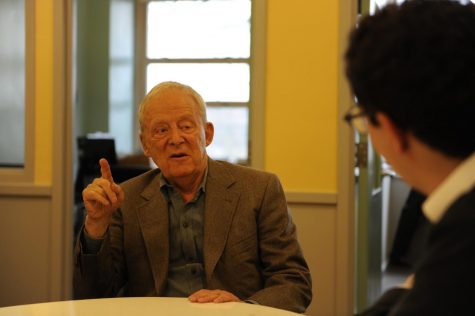
Lelyveld discusses his youth with Ronin Rodkey ’18 in an interview for the Survey.
Ronin Rodkey is an Editor-In-Chief and Managing Editor of ‘The Science Survey.’ This is Ronin’s third year writing for ‘The Science Survey,’...
Johan Wichterle is a Chief Photographer and Photography Editor for ‘The Science Survey’ and ‘The Observatory.’ Throughout his life, Johan...

